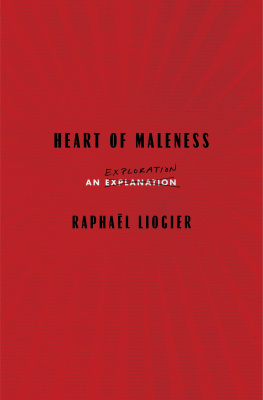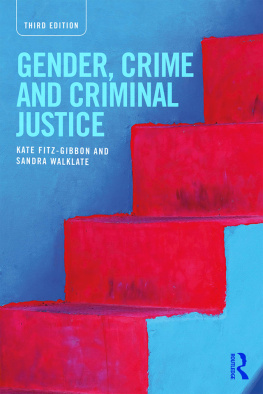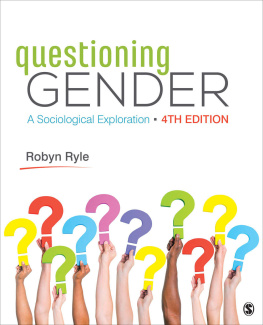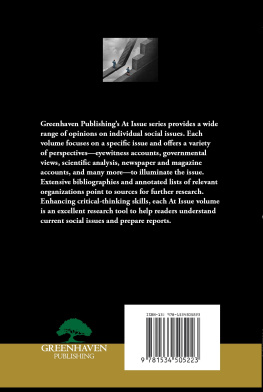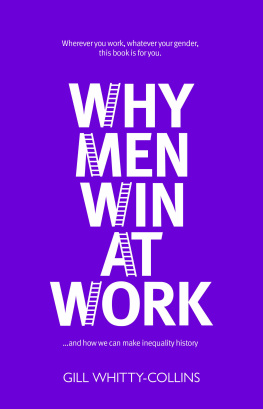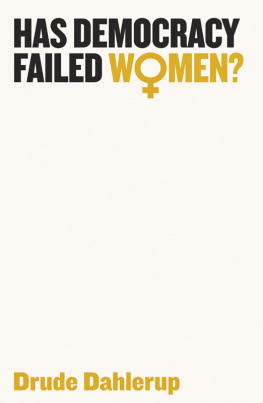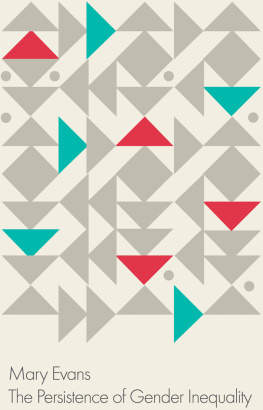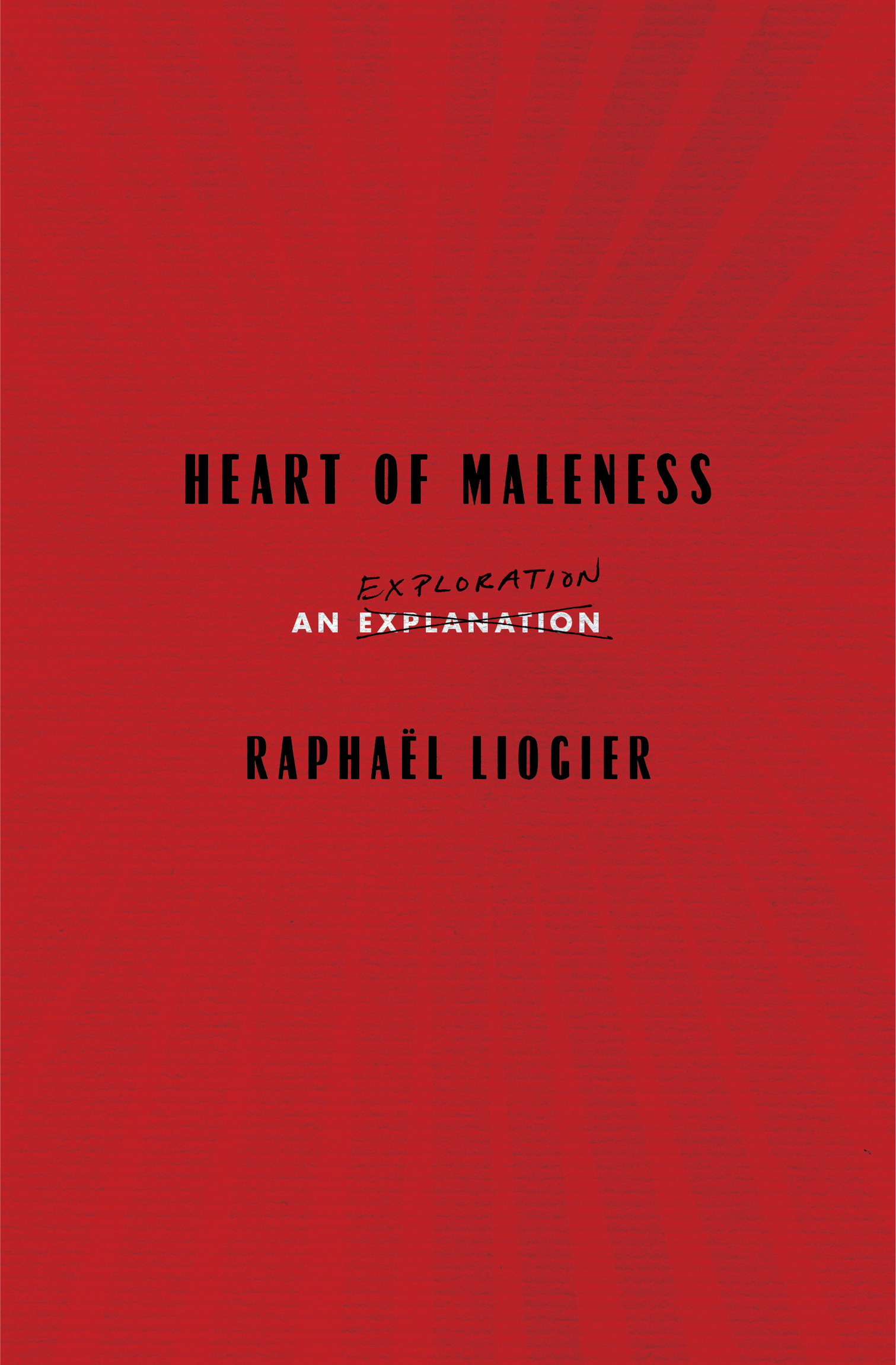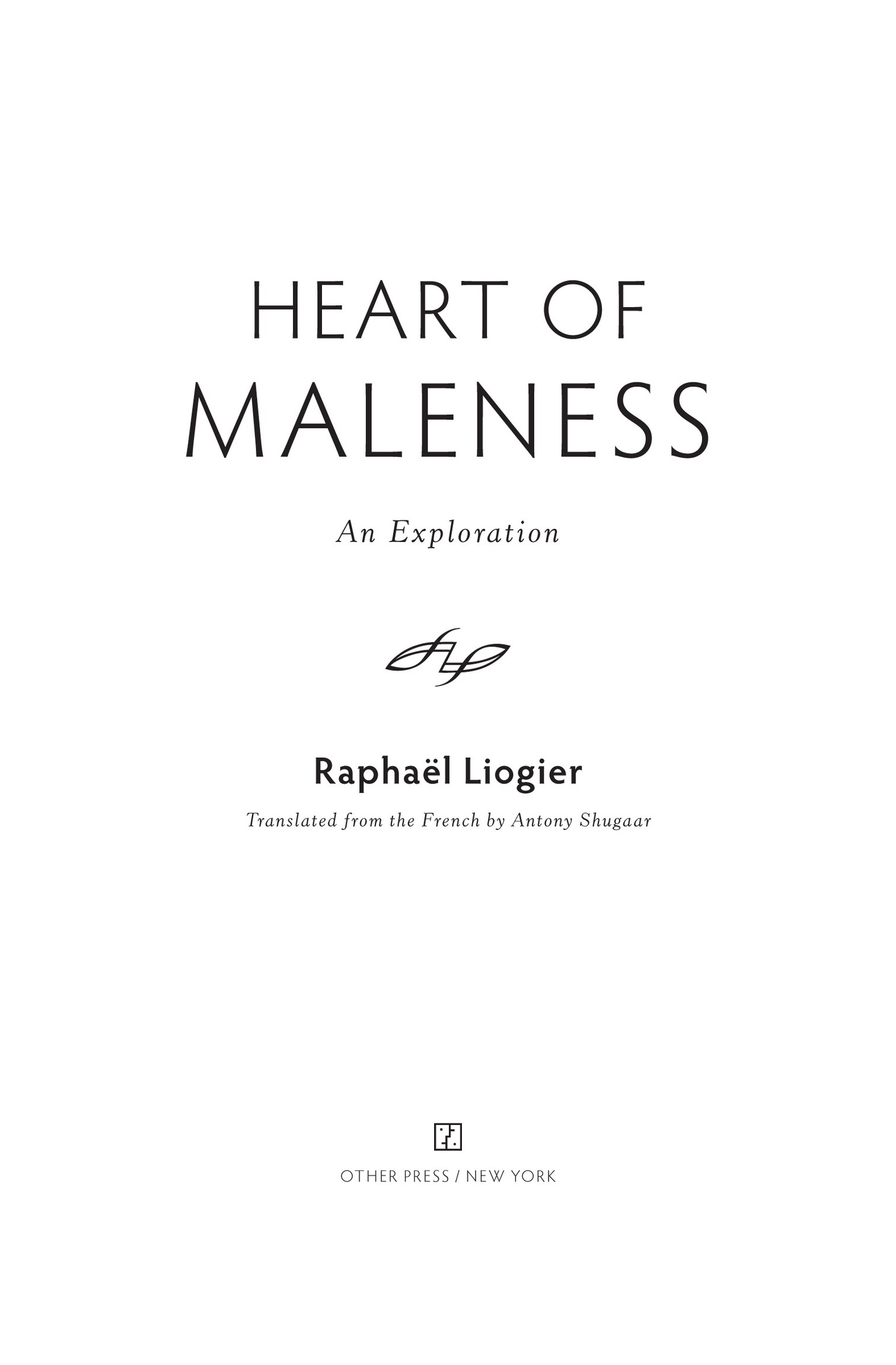Contents
Landmarks
Print Page List
Originally published in French as Descente au cur du mle in 2018 by Les liens qui librent, Paris.
Copyright Les Liens qui Librent, 2018
English translation copyright Antony Shugaar, 2020
The English-language edition has been revised, updated, and expanded by the author.
Epigraph from The Second Sex by Simone de Beauvoir and translated by Constance Borde and Sheila Malovany-Chevallier, translation copyright 2009 by Constance Borde and Sheila Malovany-Chevallier. Used by permission of Alfred A. Knopf, an imprint of the Knopf Doubleday Publishing Group, a division of Penguin Random House LLC. All rights reserved.
Epigraph from Dialectic of Enlightenment (Cultural Memory in the Present) by Max Horkheimer and Theodor W. Adorno. Copyright 1969 by S. Fisher Verlag GmbH. English translation copyright (c) 2002 by the Board of Trustees of Leland Stanford Jr. University.
Production editor: Yvonne E. Crdenas
Text designer: Jennifer Daddio / Bookmark Design & Media Inc.
All rights reserved. No part of this publication may be reproduced or transmitted in any form or by any means, electronic or mechanical, including photocopying, recording, or by any information storage and retrieval system, without written permission from Other Press LLC, except in the case of brief quotations in reviews for inclusion in a magazine, newspaper, or broadcast. For information write to Other Press LLC, 267 Fifth Avenue, 6th Floor, New York, NY 10016.
Or visit our Web site: www.otherpress.com
The Library of Congress has cataloged the printed edition as follows:
Names: Liogier, Raphal, author. | Shugaar, Antony, translator.
Title: Heart of maleness / Raphal Liogier; translated from French by Antony Shugaar.
Other titles: Descente au cur du mle. English
Description: New York : Other Press, [2020] | Originally published in French, 2018Title page verso. | Includes bibliographical references.
Identifiers: LCCN 2019033329 (print) | LCCN 2019033330 (ebook) | ISBN 9781635429930 (Trade Paperback) | ISBN 9781635429947 (ebook)
Subjects: LCSH: Sex role in the work environment. | Male domination (Social structure) | Social control. | Patriarchy. | Pay equity. | Sex discrimination against women.
Classification: LCC HD6060.6 .L57 2020 (print) | LCC HD6060.6 (ebook) | DDC 305.3dc23
LC record available at https://lccn.loc.gov/2019033329
LC ebook record available at https://lccn.loc.gov/2019033330
Ebook ISBN9781635429947
v5.4
a
No one is more arrogant toward women, more aggressive or scornful, than the man who is anxious about his virility.
SIMONE DE BEAUVOIR, The Second Sex
In fine, theres nothing so sweet as to triumph over the resistance of a fair one; I share in this the ambition of famous conquerors who fly forever from victory to victory and cannot resolve to set bounds to their desires.
MOLIRE, Don Juan
Woman as an allegedly natural being is a product of history, which denatures her.
THEODOR ADORNO, MAX HORKHEIMER, Dialectic of Enlightenment
CONTENTS
When I sat down to write this book, aghast at the stories countless women were posting with the hashtag #MeToo, I had a moment of doubt. Because I am a heterosexual, white, affluent, Western man, a citizen of the European Union, in short, supposedly immune to discrimination, I was afraid that anything I might say would lack legitimacy. At least, that is, if I was trying to produce anything more than distant musings, arms-length observations; at least, if I hoped to achieve any sort of full personal engagement with this issue. In time, though, my doubts subsided: there was no need for me to talk about women at alltheir singular nature, their essence. In any case, I wouldnt have known how. What I needed to conjure up, instead, was the world that we all share, a world in which a stunning inequality stubbornly persists, even now, an imbalance subtly fed by our common perceptions and our everyday behavior. In that case, it was enough to be human, really, to be able to claim legitimacy. To think otherwise, to believe that some dark veil could forever divide feminine from masculineto believe in a mysterious and unbridgeable differencewould have betrayed the very meaning of what I was sitting down to write.
As I ventured deeper into the accounts of sexual harassment and even rape that women had been providing since October 2017, I felt a surge of disgust. The disgust gradually turned into dismay. These men are revolting, no doubt about it. Often, pathetic. Many are shameless pigs. Above all, though, theyre men just like me. And it is the very fact that they are men that makes them pigs. Even if I was unwilling to accept it then and there, a part of my identity as a man had just been thrown into my face. It would be pure hypocrisy to deny it. Even if I had no distinct acts of harassment on my conscience, I could see, emerging vaguely in the background of these stark depictions of grim tableaux, the ways in which I myself had long been conditioned to view and desire women. I make no claim to any new gender theory, much less do I intend to lecture about feminism. But really, if I stop to think about it, Im speaking mainly to men. For that matter, Im basically writing about them, too. Im addressing them as a man, and Im writing about my own problem. Because Im convinced that, above and beyond all the media hype, women today have clearer ideas about themselves than we do. At least when it comes to what they do want and what they dont. In contrast, behind an increasingly fragile faade, my fellow men are having a hard time accepting the collapse of their empire of virility, a decline and fall that is unmistakably heralded by the worldwide impetus and power of #MeToo. They are struggling, I am struggling, we are struggling to redefine our ambitions as men, our fantasies as men, our behavior as men, our desires as men. In short, our place in the world. Our relations with women. Our identity. Even if most of us know perfectly well that we have no choice but to change.
THE BANALITY OF MALENESS
The stunning arrest of Dominique Strauss-Kahn at New Yorks JFK airport on May 14, 2011, as he was about to board a flight to Europe, did not bring with it any larger debate about the Situation of Women. And yet the whole business resulted in a worldwide media storm. The case involved a powerful man accused of sexual assault on a woman who was dependent on himmuch like what happened in the Weinstein case, six years later. He, the accused man, was the managing director of the International Monetary Fund at the time and a sure bet for future president of the French Republic. She, the alleged victim, was a young Guinean maid working at the Manhattan hotel where he was staying. It emerged in the aftermath of his arrest that the man was a perpetually randy sexual predator. He was forced out of his executive perch at the IMF and was effectively ruled out as a potential presidential candidate back in France. But he dragged down no other men in his calamitous fall. There was no domino effect. There were certainly other women, their claims suddenly cast in a far more credible light, who brought their own descriptions of the appalling behavior to which hed subjected them. Our eyes were suddenly opened to DSK as a sexual glutton, a libertine pig, a diseased lothario. He was depicted as unhinged. In a word, an abnormal individual.

